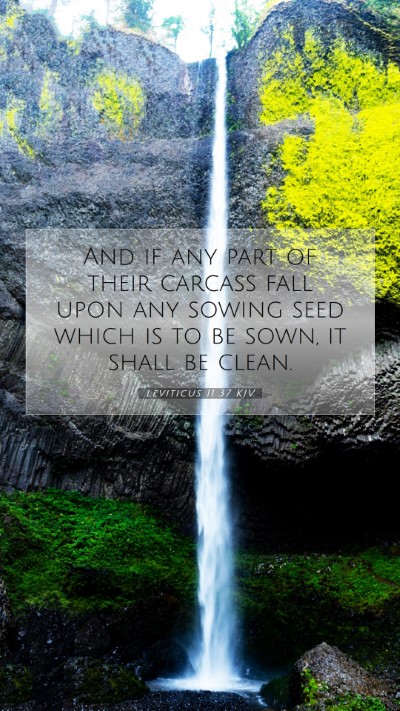Understanding Leviticus 11:37
Leviticus 11:37 states, "And if any part of their carcass fall upon any sowing seed which is to be sown, it shall be unclean." This verse is part of a broader context of dietary laws presented in Leviticus 11, which outlines clean and unclean animals and other related laws governing the Israelites. In this analysis, we will combine insights from public domain commentaries to provide a comprehensive understanding of the verse.
Verse Context and Historical Background
This verse is situated within the regulations given by God to the Israelites as they journeyed in the wilderness. The holiness code prescribed in Leviticus serves to instruct the people on how to maintain purity both physically and spiritually, which includes dietary restrictions and ritual cleanliness.
Biblical Exegesis and Analysis
According to Matthew Henry, this verse highlights God's order and the necessity of hygiene in the life of Israel. It teaches that not only must the people be cautious about what they eat, but also about the conditions that surround their food. Henry notes that the command reflects a broader principle of purity, suggesting that what comes into contact with the unclean must also be regarded as impure.
Albert Barnes observes that the term "sowing seed" indicates the importance of agriculture in ancient Israelite society. The land was sacred, and any contamination could have serious implications for crops and sustenance. This verse further emphasizes that contamination is unavoidable if unclean carcasses touch any seeds meant for sowing, reiterating the necessity for strict adherence to God's laws.
Adam Clarke elaborates on the spiritual symbolism found in this verse. He posits that the carcass represents sin and moral corruption, warning that even a small contact with sin (e.g., touching unclean animals) can lead to a broader contamination of one’s life and spiritual practices. The directive emphasizes the importance of keeping oneself free from sin and embracing purity in worship and daily living.
Applications and Moral Lessons
The overarching principle in Leviticus 11:37 is about maintaining holiness and purity in every aspect of life, particularly in activities such as eating and planting. This can be applied metaphorically to our lives today, where it is essential to guard our hearts and minds against anything that may defile our spiritual well-being.
Additionally, this verse encourages community awareness regarding the impacts of one individual’s decisions on broader society. Just as the Israelites were to maintain cleanliness in their food sources, modern believers can reflect on how their actions affect not just their own lives but also those around them.
Related Cross References
- Leviticus 11:24-25 - Discusses the unclean animals and their effects on cleanliness.
- Deuteronomy 14:2-21 - Offers further guidance on clean and unclean foods.
- 1 Peter 1:16 - Calls for holiness, reflecting the command to be holy as God is holy.
Conclusion
In conclusion, Leviticus 11:37 serves as a vital reminder of the significance of purity, both physically and spiritually, in the lives of believers. By studying such passages, individuals can gain deeper insights into biblical teachings, allowing them to strengthen their knowledge in Bible study groups, enhance their online Bible study, and utilize effective Bible study tools and resources.
This verse also offers opportunities for application in daily life, motivating believers to maintain a clean conscience and to be wary of the influences that could contaminate their spiritual practices.


